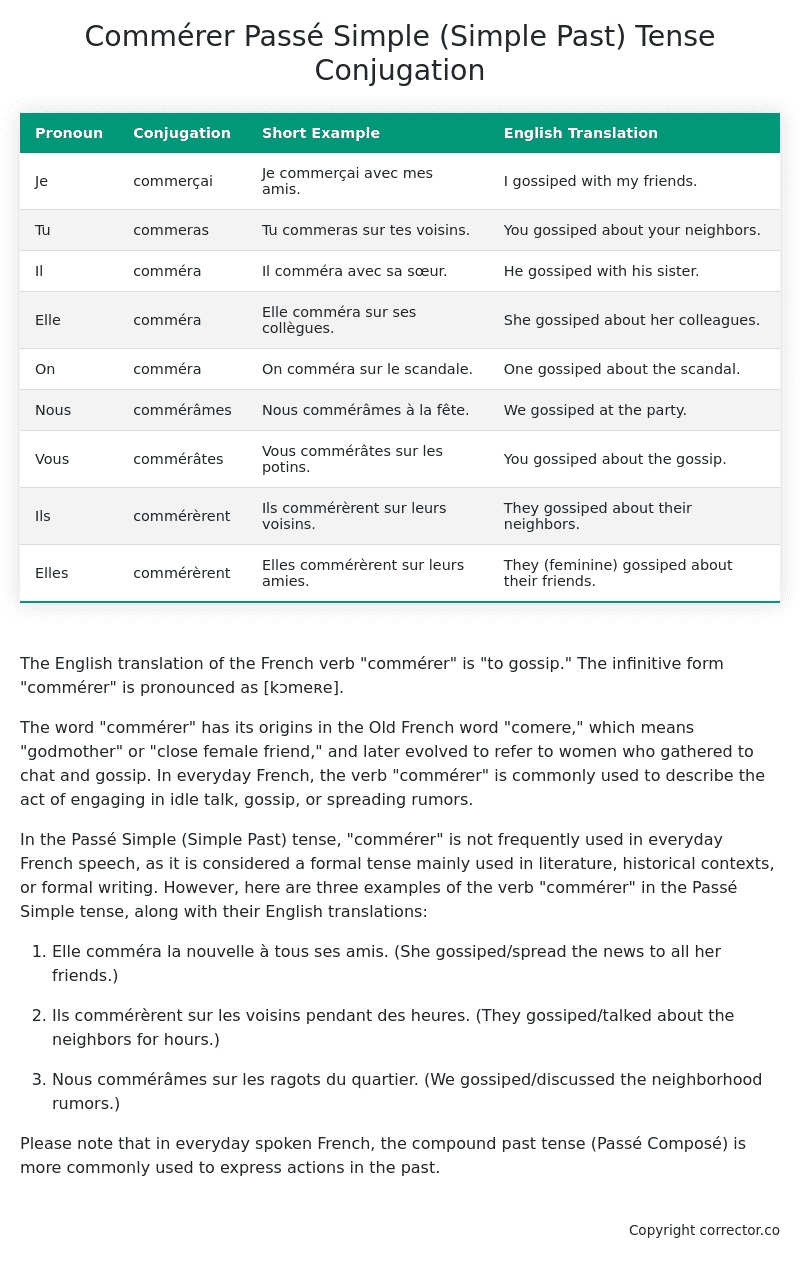Passé Simple (Simple Past) Tense Conjugation of the French Verb commérer
Introduction to the verb commérer
The English translation of the French verb “commérer” is “to gossip.” The infinitive form “commérer” is pronounced as [kɔmeʀe].
The word “commérer” has its origins in the Old French word “comere,” which means “godmother” or “close female friend,” and later evolved to refer to women who gathered to chat and gossip. In everyday French, the verb “commérer” is commonly used to describe the act of engaging in idle talk, gossip, or spreading rumors.
In the Passé Simple (Simple Past) tense, “commérer” is not frequently used in everyday French speech, as it is considered a formal tense mainly used in literature, historical contexts, or formal writing. However, here are three examples of the verb “commérer” in the Passé Simple tense, along with their English translations:
-
Elle comméra la nouvelle à tous ses amis.
(She gossiped/spread the news to all her friends.) -
Ils commérèrent sur les voisins pendant des heures.
(They gossiped/talked about the neighbors for hours.) -
Nous commérâmes sur les ragots du quartier.
(We gossiped/discussed the neighborhood rumors.)
Please note that in everyday spoken French, the compound past tense (Passé Composé) is more commonly used to express actions in the past.
Table of the Passé Simple (Simple Past) Tense Conjugation of commérer
| Pronoun | Conjugation | Short Example | English Translation |
|---|---|---|---|
| Je | commerçai | Je commerçai avec mes amis. | I gossiped with my friends. |
| Tu | commeras | Tu commeras sur tes voisins. | You gossiped about your neighbors. |
| Il | comméra | Il comméra avec sa sœur. | He gossiped with his sister. |
| Elle | comméra | Elle comméra sur ses collègues. | She gossiped about her colleagues. |
| On | comméra | On comméra sur le scandale. | One gossiped about the scandal. |
| Nous | commérâmes | Nous commérâmes à la fête. | We gossiped at the party. |
| Vous | commérâtes | Vous commérâtes sur les potins. | You gossiped about the gossip. |
| Ils | commérèrent | Ils commérèrent sur leurs voisins. | They gossiped about their neighbors. |
| Elles | commérèrent | Elles commérèrent sur leurs amies. | They (feminine) gossiped about their friends. |
Other Conjugations for Commérer.
Le Present (Present Tense) Conjugation of the French Verb commérer
Imparfait (Imperfect) Tense Conjugation of the French Verb commérer
Passé Simple (Simple Past) Tense Conjugation of the French Verb commérer (You’re reading it right now!)
Passé Composé (Present Perfect) Tense Conjugation of the French Verb commérer
Futur Simple (Simple Future) Tense Conjugation of the French Verb commérer
Futur Proche (Near Future) Tense Conjugation of the French Verb commérer
Plus-que-parfait (Pluperfect) Tense Conjugation of the French Verb commérer
Passé Antérieur (Past Anterior) Tense Conjugation of the French Verb commérer
Futur Antérieur (Future Anterior) Tense Conjugation of the French Verb commérer
Subjonctif Présent (Subjunctive Present) Tense Conjugation of the French Verb commérer
Subjonctif Passé (Subjunctive Past) Tense Conjugation of the French Verb commérer
Subjonctif Imparfait (Subjunctive Imperfect) Tense Conjugation of the French Verb commérer
Subjonctif Plus-que-parfait (Subjunctive Pluperfect) Tense Conjugation of the French Verb commérer
Conditionnel Présent (Conditional Present) Tense Conjugation of the French Verb commérer
Conditionnel Passé (Conditional Past) Tense Conjugation of the French Verb commérer
Conditionnel Passé II (Conditional Past II) Tense Conjugation of the French Verb commérer
L’impératif Présent (Imperative Present) Tense Conjugation of the French Verb commérer
L’impératif Passé (Imperative Past) Tense Conjugation of the French Verb commérer
L’infinitif Présent (Infinitive Present) Tense Conjugation of the French Verb commérer
L’infinitif Passé (Infinitive Past) Tense Conjugation of the French Verb commérer
Le Participe Présent (Present Participle) Tense Conjugation of the French Verb commérer
Le Participe Passé (Past Participle) Tense Conjugation of the French Verb commérer
Struggling with French verbs or the language in general? Why not use our free French Grammar Checker – no registration required!
Get a FREE Download Study Sheet of this Conjugation 🔥
Simply right click the image below, click “save image” and get your free reference for the commérer Passé Simple tense conjugation!

Commérer – About the French Passé Simple (Simple Past) Tense
Formation
Usage
Narration
Historical Context
Interactions with other tenses
Passé Composé
Imparfait
Conditional and Subjunctive
Summary
I hope you enjoyed this article on the verb commérer. Still in a learning mood? Check out another TOTALLY random French verb conjugation!


